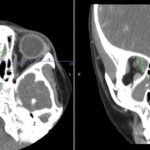
Andrey_Popov / shutterstock.com
When my daughter was a second-year internal medicine resident at Massachusetts General Hospital, Boston, she called me excitedly one evening. “Dad,” she reported, “I think I saw the optic nerve for the first time today with an ophthalmoscope.” I suppose I should have shared her exuberance, except that when I went to medical school, a pharmaceutical company gifted us an ophthalmoscope on our first day. Along with our reflex hammer and tuning fork, it was an essential emblem of the trade.
Today, if you’re making rounds in the hospital and you request an ophthalmoscope, you are regarded warily and probably told that no such tool is available. Medical training has changed; my daughter was a victim of the times because it really is true that many clues to disease outside the eye can be gained by ophthalmoscopy. (P.S., I hope my daughter will forgive me for sharing this story; my wife and I are each immensely proud of the professional accomplishments of both our physician-daughters.)
As rheumatologists, many of us chose the field because we believe we are the Sherlock Holmeses of internal medicine. We delight in being challenged by complex medical mysteries. But we have our limits. A good detective should know when to seek the expertise of another specialist.
Many of us also selected rheumatology because it demands that we understand every organ system in the body. No tissue can escape potential attack by the immune system. But for most of us, another physician probably knows more than we do about the heart, the brain, the lung, the kidney, the skin or the eye. Once upon a time, you trained to be a cardiologist. Now, cardiology has perhaps 20 subspecialties. And within rheumatology, we recognize practitioners who have special expertise in lupus, scleroderma, psoriatic arthritis, gout. I’m sure you understand my point even if I don’t list every conceivable disease seen by a rheumatologist.
Interdisciplinary Clinics
Like many academic centers throughout the world, my division has established interdisciplinary clinics. Rheumatology at Oregon Health & Science University (OHSU), Portland, partners with dermatology, pulmonary, neurology and ophthalmology. And we need a similar clinic with nephrology. Other institutions collaborate to care for patients with regional problems, such as hand disease. Sports medicine, cardiology, fibromyalgia and gastroenterology represent opportunities for collaboration.
These types of clinics optimize patient care because communication is greatly facilitated. These types of clinics are ideal for teaching because the trainee is exposed to at least two perspectives that presumably are being offered by experts. These types of clinics are ideal for research because patients with similar conditions can be seen in a volume to allow for meaningful insights. And these types of clinics provide the ultimate in convenience for the patient because no delay is experienced in referring to the second specialist.


